新概念第一册 51课 lesson51
- 格式:ppt
- 大小:2.39 MB
- 文档页数:28
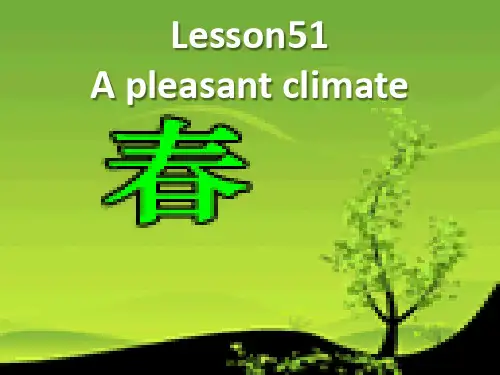
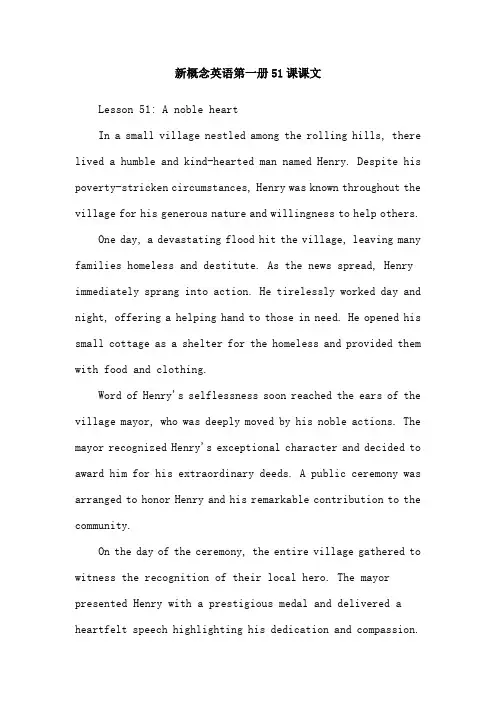
新概念英语第一册51课课文Lesson 51: A noble heartIn a small village nestled among the rolling hills, there lived a humble and kind-hearted man named Henry. Despite his poverty-stricken circumstances, Henry was known throughout the village for his generous nature and willingness to help others. One day, a devastating flood hit the village, leaving many families homeless and destitute. As the news spread, Henry immediately sprang into action. He tirelessly worked day and night, offering a helping hand to those in need. He opened his small cottage as a shelter for the homeless and provided them with food and clothing.Word of Henry's selflessness soon reached the ears of the village mayor, who was deeply moved by his noble actions. The mayor recognized Henry's exceptional character and decided to award him for his extraordinary deeds. A public ceremony was arranged to honor Henry and his remarkable contribution to the community.On the day of the ceremony, the entire village gathered to witness the recognition of their local hero. The mayor presented Henry with a prestigious medal and delivered a heartfelt speech highlighting his dedication and compassion.The villagers applauded thunderously, expressing their gratitude for Henry's unwavering support during the crisis. In his acceptance speech, Henry humbly shared, 'I am honored and grateful for this recognition, but it is not the medal that matters to me. What truly matters is the well-being and happiness of my fellow villagers. I believe that we should all lend a helping hand when others are in need. Together, we can overcome any challenge and create a stronger, more compassionate community.'Henry's words resonated deeply with everyone present. Inspired by his profound wisdom, the villagers pledged to follow his example and pay it forward. They vowed to lend their support to anyone in need, fostering a sense of unity and generosity within the village.From that day forward, Henry's legacy lived on, and the spirit of compassion thrived in the village. Whenever a crisis struck, the villagers rallied together, providing assistance and comfort to those affected. Henry's noble heart had ignited a spark within each villager, reminding them of the power of kindness and the difference a single person can make in the lives of many.As time passed, the village flourished, not only inmaterial wealth but also in the richness of its community spirit. The bond between the villagers grew stronger, and their willingness to support one another became the foundation of their success.Henry's story serves as a timeless reminder that it is not wealth or status that defines a person's worth but rather the goodness of their heart and their willingness to make a positive impact on the lives of others. In a world often overshadowed by self-interest, Henry's noble heart stands as a shining example of the transformative power of compassion, forever etched in the hearts and minds of the villagers.。

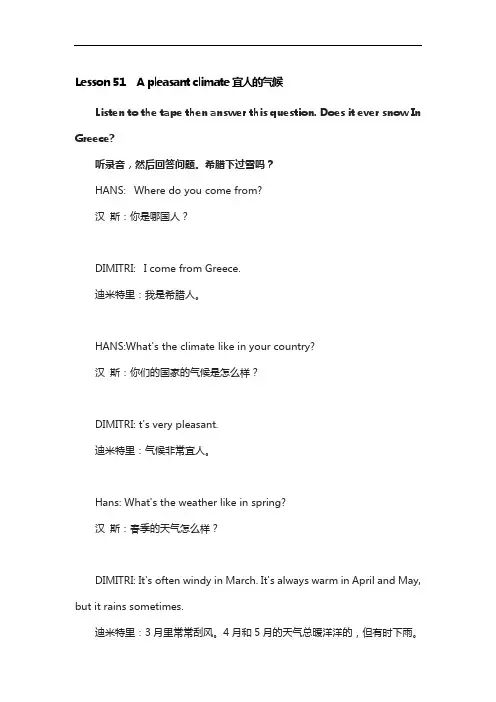
Lesson 51 A pleasant climate宜人的气候Listen to the tape then answer this question. Does it ever snow In Greece?听录音,然后回答问题。
希腊下过雪吗?HANS: Where do you come from?汉斯:你是哪国人?DIMITRI: I come from Greece.迪米特里:我是希腊人。
HANS:What's the climate like in your country?汉斯:你们的国家的气候是怎么样?DIMITRI: t's very pleasant.迪米特里:气候非常宜人。
Hans: What's the weather like in spring?汉斯:春季的天气怎么样?DIMITRI: It's often windy in March. It's always warm in April and May, but it rains sometimes.迪米特里:3月里常常刮风。
4月和5月的天气总暖洋洋的,但有时下雨。
HANS: What's it like in summer?汉斯:夏季的天气如何呢?DIMITRI: It's always hot in June, July and August. The sun shines every day.迪米特里:6月、7月和8月的天气总是炎热的。
每天都出太阳。
HANS: Is it cold or warm in autumn?汉斯:秋季的天气是冷还是暖呢?DIMITRI: It's always warm in September and October. It's often cold in November and it rains sometimes.迪米特里:9月和10月总是很暖和,11月常常就冷了,而且有时下雨。
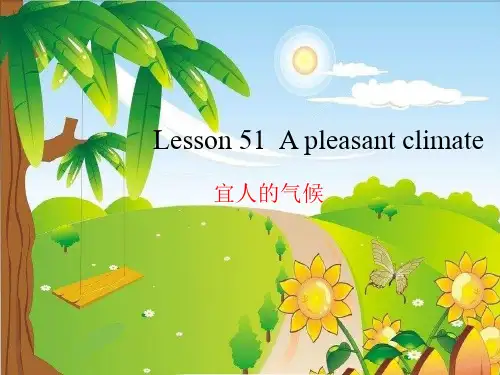
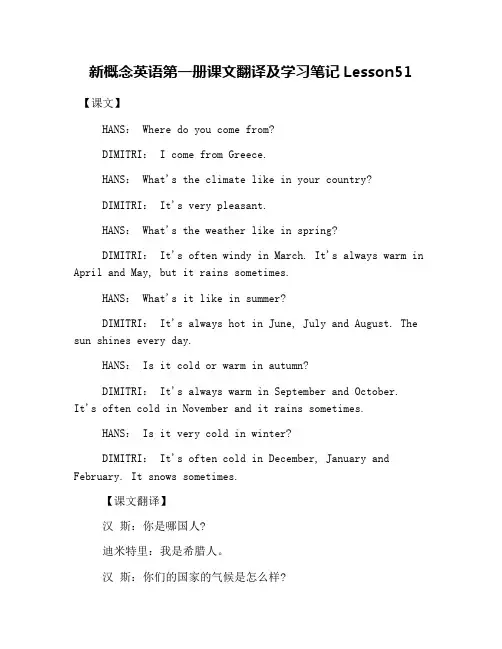
新概念英语第一册课文翻译及学习笔记Lesson51【课文】HANS: Where do you come from?DIMITRI: I come from Greece.HANS: What's the climate like in your country?DIMITRI: It's very pleasant.HANS: What's the weather like in spring?DIMITRI: It's often windy in March. It's always warm in April and May, but it rains sometimes.HANS: What's it like in summer?DIMITRI: It's always hot in June, July and August. The sun shines every day.HANS: Is it cold or warm in autumn?DIMITRI: It's always warm in September and October.It's often cold in November and it rains sometimes.HANS: Is it very cold in winter?DIMITRI: It's often cold in December, January and February. It snows sometimes.【课文翻译】汉斯:你是哪国人?迪米特里:我是希腊人。
汉斯:你们的国家的气候是怎么样?迪米特里:气候非常宜人。
汉斯:春季的天气怎么样?迪米特里:3月里常常刮风。
4月和5月的天气总暖洋洋的,但有时下雨。
汉斯:夏季的天气如何呢?迪米特里:6月、7月和8月的天气总是炎热的每天都出太阳。
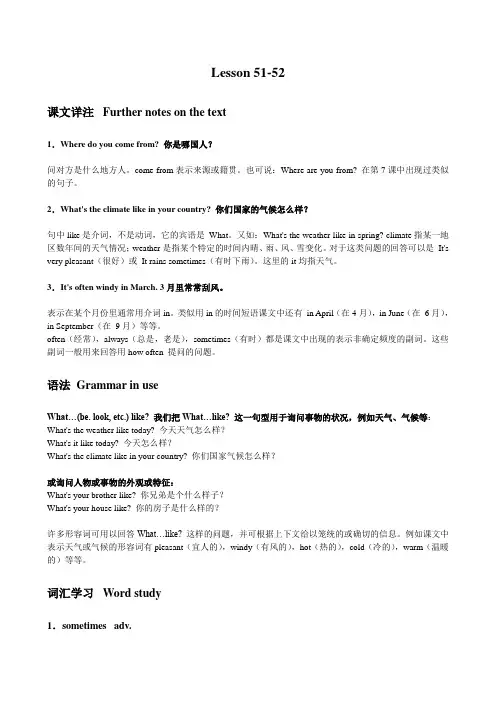
Lesson 51-52课文详注Further notes on the text1.Where do you come from? 你是哪国人?问对方是什么地方人。
come from表示来源或籍贯。
也可说:Where are you from? 在第7课中出现过类似的句子。
2.What's the climate like in your country? 你们国家的气候怎么样?句中like是介词,不是动词,它的宾语是What。
又如:What's the weather like in spring? climate指某一地区数年间的天气情况;weather是指某个特定的时间内晴、雨、风、雪变化。
对于这类问题的回答可以是It's very pleasant(很好)或It rains sometimes(有时下雨)。
这里的it均指天气。
3.It's often windy in March. 3月里常常刮风。
表示在某个月份里通常用介词in。
类似用in的时间短语课文中还有in April(在4月),in June(在6月),in September(在9月)等等。
often(经常),always(总是,老是),sometimes(有时)都是课文中出现的表示非确定频度的副词。
这些副词一般用来回答用how often 提问的问题。
语法Grammar in useWhat…(be. look, etc.) like? 我们把What…like? 这一句型用于询问事物的状况,例如天气、气候等:What's the weather like today? 今天天气怎么样?What's it like today? 今天怎么样?What's the climate like in your country? 你们国家气候怎么样?或询问人物或事物的外观或特征:What's your brother like? 你兄弟是个什么样子?What's your house like? 你的房子是什么样的?许多形容词可用以回答What…like? 这样的问题,并可根据上下文给以笼统的或确切的信息。

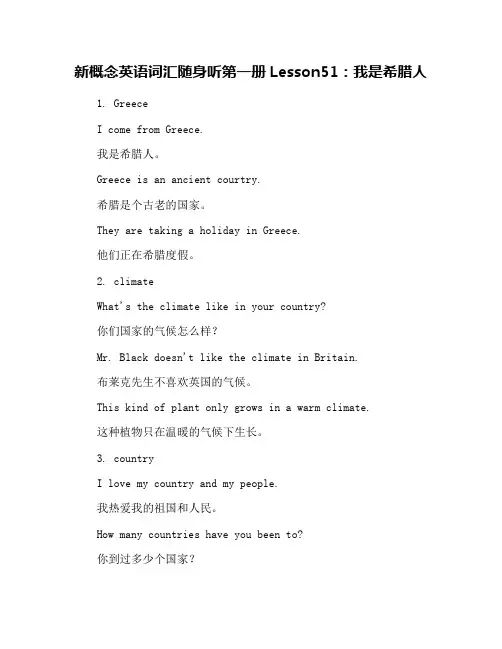
新概念英语词汇随身听第一册Lesson51:我是希腊人1. GreeceI come from Greece.我是希腊人。
Greece is an ancient courtry.希腊是个古老的国家。
They are taking a holiday in Greece.他们正在希腊度假。
2. climateWhat's the climate like in your country?你们国家的气候怎么样?Mr. Black doesn't like the climate in Britain.布莱克先生不喜欢英国的气候。
This kind of plant only grows in a warm climate.这种植物只在温暖的气候下生长。
3. countryI love my country and my people.我热爱我的祖国和人民。
How many countries have you been to?你到过多少个国家?4. pleasantIt's very pleasant.气候非常宜人。
What a pleasant smell!这气候真好闻。
It's a pleasant trip.这次旅程非常愉快。
5. weatherWhat's the weather like in spring?春季的天气怎么样?What's the weather like today?今天的天气怎么样?We will go camping if the weather is nice.如果天气好的话,我们就去露营。
6. springFlowers bloom in spring.春天,百花齐放。
The weather is nice in spring.在春天,气候非常好。
7. windyIt's often windy in March.三月里常常刮风It's windy today.今天刮风。
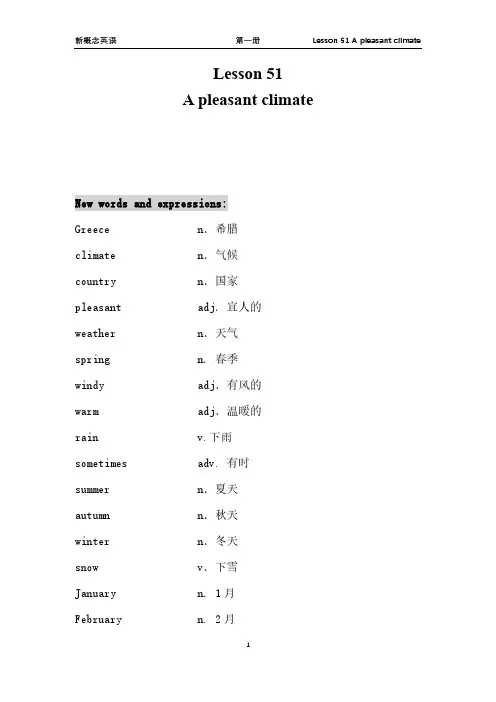
Lesson 51A pleasant climateNew words and expressions:Greece n.希腊climate n.气候country n.国家pleasant adj. 宜人的weather n.天气spring n. 春季windy adj.有风的warm adj.温暖的rain v.下雨sometimes adv. 有时summer n.夏天autumn n.秋天winter n.冬天snow v.下雪January n. 1月February n. 2月March n n. 3月April n. 1月May n. 5月June n. 6月July n. 7月August n. 8月September n. 9月October n. 10月November n. 11月December n. 12月Greece n.希腊(国名)eg.--- Where does Jim come from?--- Jim comes from Greece.eg.--- Where is Jim from?--- He's from Greece.Greek1) n.希腊人(国籍)2) adj.希腊的eg.--- What nationality is Mr. White?--- He is Greek.eg. I am a Greek engineer.eg.--- Are they Greek doctors?--- Yes, they are.--- No, they aren't.climate n.气候eg. What's the climate like in your country?eg. I don't like the climate here.country n. 国家eg. China is a big country.eg.--- Do you like this country?--- Yes, I do.pleasant1) adj. 天气宜人的eg. It's quite pleasant today.2) adj. 令人愉悦的eg. What a pleasant surprise! 多么好的一个惊喜呀! eg. The flower gives off a pleasant smell.这支花散发出一种令人愉悦的香味。
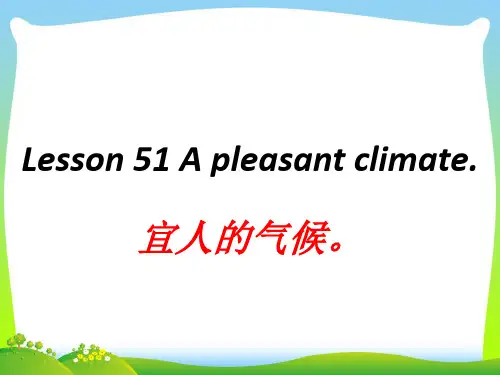
Lesson 51 A pleasant climate第一课一、Teaching aims:1.掌握单词:月份,表示气候的单词,国家2.掌握句子:Where do you come from?和What’s the weather like in spring?二、Key point and difficult points:1.区分weather 和climate2.区分程度副词3.学会问天气三教学1.Warming-upa.How is the weather?b.形容天气的词汇(weather:rain,wind,storm,cloud,sun,snow,fog, cold...)结合图片:What’s the weather like in the picture?(1. snowy 2.sunny 3.foggy 4. windy 5.cloudy 6. rainy )2.听录音,回答问题:Does it ever snow in Greece?1.Where and what do they talk about?2. What is the climate like in Greece?(It’s very pleasant.)3.How many months are there in Spring? What are they?4.Is it hot or cool in summer?5.Does it ever snow in winter3.简单介绍下希腊(欧洲东南部,是西方文明的发源地)Greece希腊Greek希腊人、希腊人的4.根据课文概括四个季节的特点Q:What’s the weather like in spring/Summer/Autumn/Winter?a. Spring春天:often windy(有风的);always warm;rains sometimes(三月到五月:March, April, May)b.Summer夏天:always hot;the sun shines(闪耀,耀眼)every day(六月到八月:June, July, August)c.Autumn/Fall秋天:always warm;often cold;rains sometimes(九月到十一月:September, October, November)d.Winter冬天:often cold;snow sometimes(十一月到来年二月:December, January, February)月份的缩写:(Jan. Feb. Mar. Apr. May. June. July. Aug. Sep/Sept. Oct.Nov. Dec.)5.表示气候的形容词Warm-cool hot-cold wet-dry mild温和的语法精讲Where do you come from? 你是哪国人?结构分析本句用于询问对方是哪儿的人,还可以用“Where are you from?”来表达,回答时“I come from…”或“I am from…”。
Lesson 51 A pleasant climate 宜人的气候Does it ever snow in Greece? 希腊下过雪吗?HANS : Where do you come from?汉斯:你是哪国人?DIMITRI : I come from Greece.迪米特里:我是希腊人。
HANS : What’s the climate like in your country?汉斯:你们国家的气候怎么样?DIMITRI : It’s very pleasant.迪米特里:非常宜人。
HANS : What’s the weather like in spring?汉斯:春天的天气怎么样?DIMITRI :It’s often windy in March. It’s always warm in April and May, but it rains sometimes.迪米特里:3月经常刮风。
4月5月的天气总是暖和的,但有时下雨。
HANS :What’s it like in summer?汉斯:夏天的天气怎么样?DIMITRI : It’s always hot in June, July and August. The sun shines very day.迪米特里:6月、7月和8月天气总是很热。
每天都出太阳。
HANS : Is it cold or warm in autumn?汉斯:秋天的天气是冷还是暖?DIMITRI : It’s always warm in September and October. It’s often cold in November and it rains sometimes.迪米斯特:9月和10月总是暖和的。
11月就常常冷了,有时还下雨。
HANS : Is it very cold in winter?汉斯:冬天的天气非常冷吗?DIMITRI : It’s often cold in December, January and February. It snows sometimes.迪米斯特:12月、1月和2月常常很冷。
新概念英语第一册51课教案Lesson 51: Report on Some Universities《新概念英语第一册》第51课:对几所大学的报告Introduction引言In this lesson, we will discuss an important aspect of education - universities. A report will be presented on some well-known universities, highlighting their strengths, facilities, and academic programs. Through this discussion, students will gain a comprehensive understanding of different universities and be better equipped to make informed decisions about their future education.本课将讨论教育的一个重要方面,即大学。
我们将对几所著名的大学进行报告,重点介绍它们的优势、设施和学术项目。
通过这次讨论,学生们将全面了解不同大学,并能更好地做出关于未来教育的明智决策。
I. University AA大学University A is known for its rigorous academic programs and high standards of research. It offers a wide range of courses in various disciplines, including engineering, business, arts, and sciences. The university's faculty consists of renowned scholars and industry professionals who are experts in their respective fields. This ensures high-quality instruction for students.A大学以其严谨的学术项目和高标准的研究而闻名。
Lesson 51 A pleasant climate 宜人的气候1.Greece /gri:s/ n.希腊Greek/gri:k/ 希腊的;希腊人(的);希腊语(的)My boss comes from Greece. 我老板来自希腊。
What is Greece like? 希腊是怎样的?Are you from Greece? 你来自希腊吗?Can you speak Greek? 你会说希腊语吗?2. climate /'klaimit/ n.气候What is the climate like in Beijing? 北京的气候如何?Do you like the climate here? 你喜欢这里的气候吗?He doesn’t like the cold climate. 他不喜欢寒冷的气候。
Orange trees don’t grow in this climate. 橘树在这气候里生长不了。
3. weather /'weðə/ n.天气What’s t he weather like today? 今天天气怎样?The weather here is pleasant. 这里的天气很宜人。
* climate,weather 区别:climate指一个地方长期的较为固定的天气状态,包括阴晴、干湿、风雨等情况在内,是可数名词。
weather则指某特定日子的气象情况,是不可数名词。
4. country /'kʌntri/ n. 国家;乡村(复) countriesWhat is your favourite country? 你最喜欢什么国家?What’s the climate like in your country? 你国家的气候如何?How many countries can you see in the map? 你在这张地图上能看到多少个国家?5. pleasant /'plezənt/ adj. 宜人的;美好的;讨喜的I’ve got a pleasant house. 我有个舒适的房子。